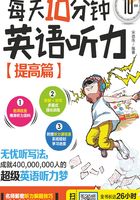
第4周 What would you do if you had a lot of money?如果你有很多钱,你会用来做什么?
训练重点:核心词先睹为快
coin note exchange check out discount origin currency jewellery
finance formation barter commodity perishable available recycle
value compare cash babysitter credit card lottery ticket stand for

步骤一:听“答题录音”,为下列试题作答。
听句子,选择与其意思最相符的选项。(每个句子读一遍)
1.A. I will pay 3,000 yuan first, then 500 yuan per month for three months.
B. I will pay 1,500 yuan first, then 3,000 yuan for the last three months.
C. I will pay 3,000 yuan first, then 500 yuan for one month.
2.A. Tom once possessed more than £100,000.
B. Tom will spend 10,000,000 euros for personal ads.
C. Tom has $100,000,000.
3.A. The shop will charge less if the customers pay in cash.
B. If customers buy more, the shop will knock 10% off.
C. The price is 80% off if customers pay in cash.
4.A. The dress costs a large sum of money.
B. The dress is only worth a penny.
C. The dress is worth the money it costs.
5.A. Houses in Shanghai are much more expensive than those in Wuxi.
B. Houses in Shanghai are four times more expensive than those in Wuxi.
C. Houses in Wuxi are three times more expensive than those in Shanghai.
步骤二:请合上本书,听“听写录音”。根据录音要求,把听到的内容写到空白练习纸上。检查核对之后,把没有听写出来或拼写错误的单词,抄写在下面的横线上,便于重点复习。
__________ __________ __________
__________ __________ __________
__________ __________ __________

步骤一:听“答题录音”,为下列试题作答。
听短对话,选择正确的答案。(每段对话读一遍)
1.Why does the woman look for the nearest bank?
A. Because she wants to save money.
B. Because she wants to withdraw money.
C. Because she wants to exchange her currency.
2.How much does the woman expect to get for each hour?
A. 60 yuan.
B. 30 yuan.
C. 120 yuan.
3.How much money will the woman pay?
A. 200 yuan.
B. 720 yuan.
C. 800 yuan.
4.Where does this conversation most probably take place?
A. In a shop.
B. In a library.
C. In a hotel.
5.How much does the woman pay for the sneakers?
A. 100 yuan.
B. 90 yuan.
C. 10 yuan.
步骤二:请合上本书,听“听写录音”。根据录音要求,把听到的内容写到空白练习纸上。检查核对之后,把没有听写出来或拼写错误的单词,抄写在下面的横线上,便于重点复习。
__________ __________ __________
__________ __________ __________
__________ __________ __________

步骤一:听“答题录音”,为下列试题作答。
听长对话,选择正确的答案。(本段对话读两遍)
1.What does the man plan to do if he wins the lottery?
A. Travel around the world with the woman.
B. Invest heavily in his furniture business.
C. Hire a babysitter and a manager.
2.What's the probable relationship between the two speakers?
A. Employee and employer.
B. Teacher and student.
C. Husband and wife.
3.What's the woman worried about if they go travelling around the world?
A. She is worried that they don't have enough money.
B. She is worried that nobody takes care of Peter and their business.
C. She is worried that they can't find a satisfying travel agency.
4.How much will the woman spend on travel if she has much money?
A. 15%.
B. 40%.
C. 10%.
5.What is the woman looking for?
A. Her keys.
B. Her handbag.
C. Her jewellery.
步骤二:请合上本书,听“听写录音”。根据录音要求,把听到的内容写到空白练习纸上。检查核对之后,把没有听写出来或拼写错误的单词,抄写在下面的横线上,便于重点复习。
__________ __________ __________
__________ __________ __________
__________ __________ __________

步骤一:听“答题录音”,为下列试题作答。
听长对话,根据听到的内容填空,每空不超过三个单词。(本段对话读两遍)

步骤二:请合上本书,听“听写录音”。根据录音要求,把听到的内容写到空白练习纸上。检查核对之后,把没有听写出来或拼写错误的单词,抄写在下面的横线上,便于重点复习。
__________ __________ __________
__________ __________ __________
__________ __________ __________

步骤一:听“答题录音”,为下列试题作答。
听短文,判断正(T)误(F)。(本篇短文读两遍)
1.People once exchanged goods or services for other goods or services.
2.Salt, tea, tobacco, cattle and seeds were once used as money.
3.Metal objects were introduced as money around 600 BC.
4.The Chinese were the fi rst to use paper money as early as 1200s.
5.Nowadays people have many ways to pay for things.
步骤二:请合上本书,听“听写录音”。根据录音要求,把听到的内容写到空白练习纸上。检查核对之后,把没有听写出来或拼写错误的单词,抄写在下面的横线上,便于重点复习。
__________ __________ __________
__________ __________ __________
__________ __________ __________
听力技巧:熟能生巧,精益求精
留意有关货币
很多听力材料是围绕各国货币来设计内容的,因此,熟悉一些主要国家的货币名称也很重要。常见的货币名称可以提示考生对话发生的国家或地区,也为证明说话者身份提供了信息。下面列举一些常见的货币名称。

讲到货币,就不能不讲银行。银行(bank)是负责货币流通的机构,主要业务:存款(deposit),汇款(remittance),兑换(exchange),外币(foreign currency),汇率(rate),信用卡(credit card)等,有的银行还经营金融市场(fi nancial market)、证券交易所(stock exchange)等。